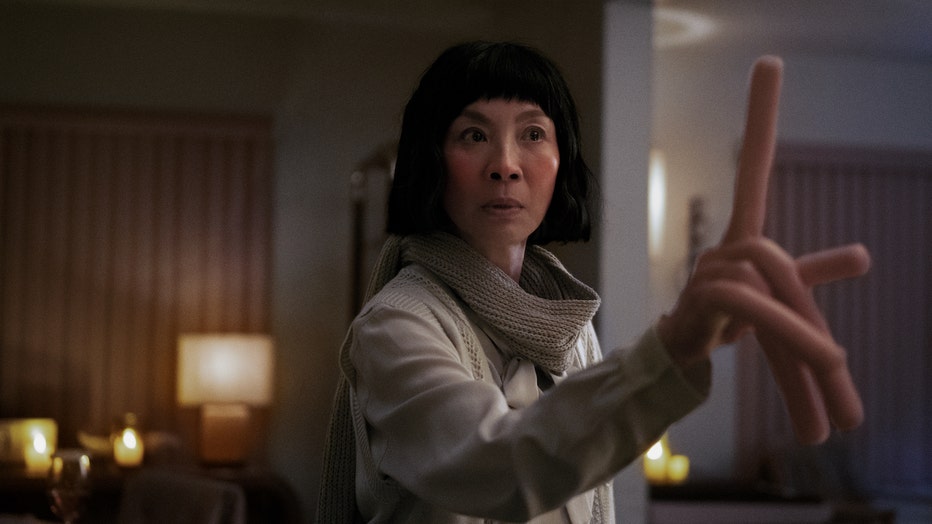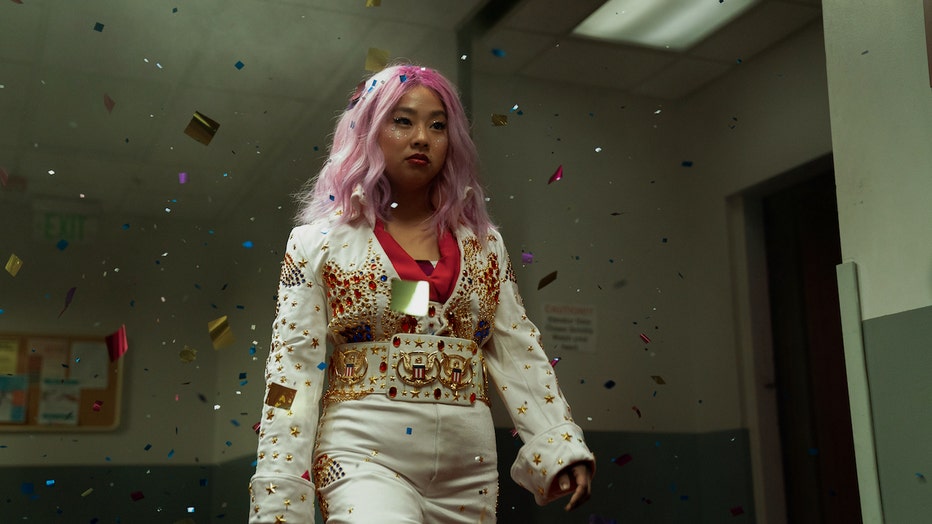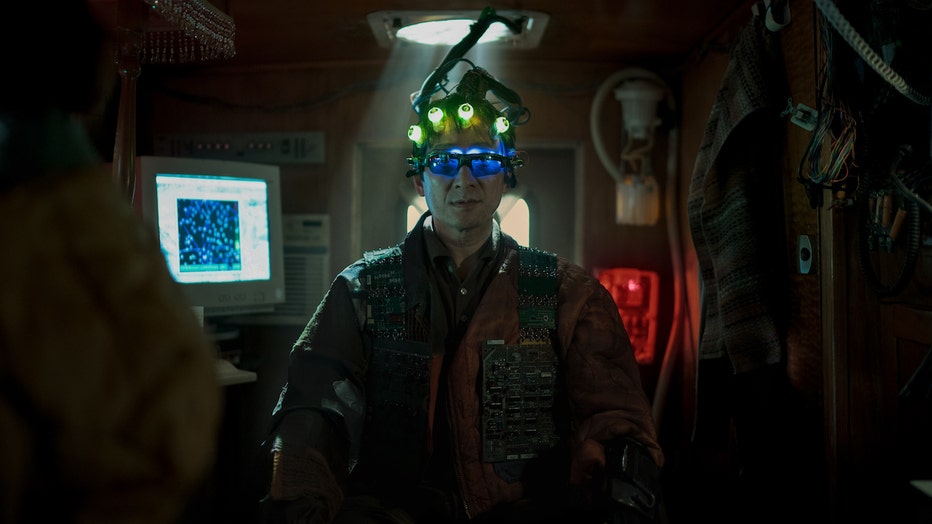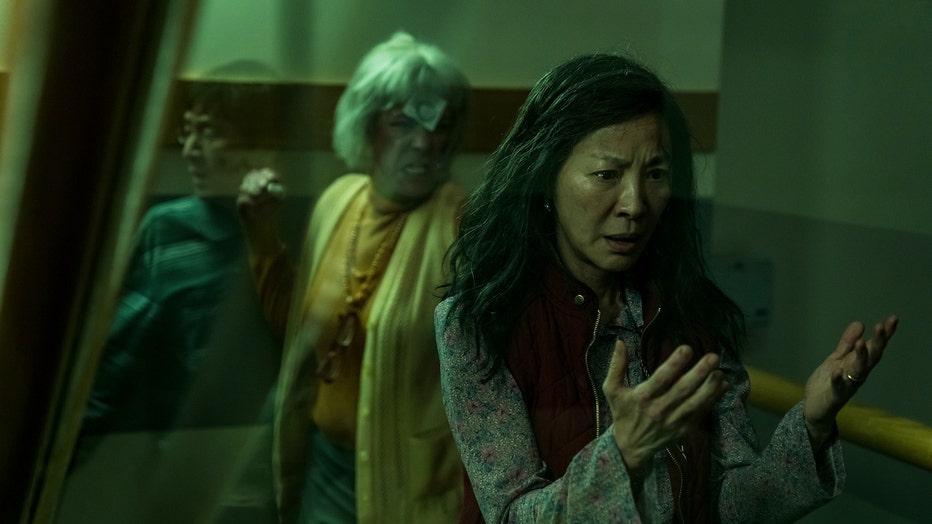Interview: ‘Everything Everywhere All At Once’ directors on the power of Michelle Yeoh
CHICAGO - Daniel Kwan and Daniel Scheinert, who collectively go by the filmmaking moniker Daniels, are no strangers to the bizarre (and even the downright perverse). Their feature film debut, "Swiss Army Man," dressed Daniel Radcliffe up as a corpse whose gale-force farts catapulted a depressed Paul Dano back to life and civilization. But Daniels used their bawdy, out-there concept to hone in on grander emotional truths about loneliness and friendship, allowing us to dream of a world where we can embrace each other’s faults, no matter how flatulent.
RELATED: Review: ‘Everything Everywhere All At Once' is transcendent and a bit exhausting
Six years later, the pair are back, stretching that devil-may-care ambition even further with "Everything Everywhere All at Once." Their latest encompasses concepts as vast as the entire multiverse and as intimate as a middle-aged woman (Michelle Yeoh’s Evelyn Wang) reconnecting with her fractured family — even if she has to do so by tapping into every possible version of herself from the vast web of universes that connect us to every decision we never made.
It’s a film as dizzying in its ambition as it is hilarious, with Daniels leveraging all the high-tilt chaos they perfected in music videos like DJ Snake and Lil Jon’s "Turn Down for What?" to launch audiences into a world where anything is possible — and just might happen right in front of you.
The film opened in limited theaters back in March, but on April 8, it’ll be everywhere (all at once.) Ahead of its wide release FOX sat down with Daniels to talk about the origins of the project, how their working relationship has evolved, and their goals of making the world — and the movie industry — a kinder, more ethical place, one weirdo gag at a time.
This interview has been edited and condensed for clarity.

Michelle Yeoh in "Everything Everywhere All At Once." Photo: A24.
While the film is ostensibly about the multiverse and the endless possibilities of who we are and what we can be, it all still has to take place inside that cramped tax office, which is such a mundane, yet robust location. How did you find that place
DANIEL SCHEINERT: We texted our production designer, Jason, whether he knew of any cool office buildings because he’s shot everywhere. And he said, "Yeah, you’re going to want to go to this one in Simi Valley, here’s the address." We went there and thought it was awesome, but it was a little too far away. We scouted about twenty other office buildings, but we ended up going back to the one Jason sent us and shot there. It was staring us right in the face the whole time.
DANIEL KWAN: It had so many different looks; as you said, it’s robust, and there’s a lot built into the architecture. If it didn’t have the right look for something, we’d just build or alter it. We used the space as a mini soundstage, especially the cafeteria. We built everything from the apartment set to the interior of the Alphaverse RV with all the technology that looks like "Star Wars" in that cafeteria.
DS: We set up all the production offices in the building too, so we could talk to the line producers or the coordinators of each department without them being so spread out. So it’s even more robust than you think.
DK: That was very efficient, very summer camp.
It’s been mentioned before that you guys originally wrote the script in mind for Michelle [Yeoh], playing a fictionalized version of her movie-star self. When she requested that she not play herself, you switched focus to Evelyn Wang, a closed-off laundromat owner and working-class matriarch. How did that change impact the story you wanted to tell?
DS: The main thing that changed was it gave Michelle permission to create a character and not compare it to herself. The script didn’t change much, but I think she needed it for her performance. She wanted to play this character without having to fact-check us and say, "This isn’t who I am." And we got to create a woman we fell in love with.
RELATED: New movie roundup: ‘Morbius,’ Shmorbius
DK: The first day, we did a camera test with her in full makeup. We’re doing all the tests with the wig and the bruising and blood loss, and she lost her mind enough to start goofing off. She became not Michelle. She was being so goofy: pretending to be a witch, trying to chase me and tickle me. That she wasn’t using her name, and that she was in a completely different body, gave her full license to play, and we needed that for the movie.
Given the sheer number of multiverses and alternate selves you had to juggle, how did you keep it all straight?
DK: Lots of diagrams. [Laughs]
A conspiracy wall?
DK: Sometimes, yeah! Sometimes it looked like subway maps, with all their various connections. I tried one where it was like concentric circles that kept expanding outward, trying to connect all the dots.
We like to write from a place where we don’t know why we’re writing or where it’s going to go at first, just so we can find something unique or pure that isn’t coming from our conscious brains actively trying to solve a problem. After that, we distill it all down and figure out what the movie’s actually about.
DS: The a-ha moment for me came after we’d thrown a ton of stuff at the wall, and written so many universes across a couple of drafts. Then, we zeroed in on Evelyn’s character and tried to focus on her journey from a classical screenwriting perspective. What does she want? What are her challenges? Suddenly, universes started to fall by the wayside, until we found the ones that would make her journey relatable.
We had to kill some darlings, for sure. There was one darling we didn’t kill until we’d spent the time and money to shoot it. Finally, one day, we’re like, "Okay, Spaghetti Baby Noodle Boy doesn’t belong in our movie."

Stephanie Hsu in "Everything Everywhere All At Once." Photo: A24.
And I’m sure shooting it was a conceptual nightmare. How did you figure out the various aesthetic schemes for each universe, right down to choosing different aspect ratios?
DK: Every film teaches the audience how to watch itself, right? Genre is something everybody understands inherently, even if they don’t have the words for it. So we said, let’s go fully into each genre: the lenses we use, the color treatment, the aspect ratio, the types of music, the sound design, everything about it.
The aspect ratio changes always depended on what we wanted the audience to feel; if we wanted it to feel natural, we’d have the ratios grow and shrink and breathe more elegantly. If we want it to feel like you’re getting slapped in the face? We’d just hard cut between them like the literal frame was breaking. All of it was in pursuit of giving the audience a chaotic but guided rollercoaster ride.
This question is for Daniel Scheinert: Since "Swiss Army Man," you went off on your own to direct 2019’s crime comedy "The Death of Dick Long" before reuniting with Dan for "Everything Everywhere All at Once." What did you bring to your dynamic coming back?
DS: I wanted to play with how we make movies, not just what the movies are. It was a very exciting adventure, trying to make the movie in an ethical and fun way, then take those lessons and apply them to this movie.
DK: It’s a real process: What can we do to undo the norms in our industry? Because it’s so toxic, and so based on really old, regressive systems of power.
DS: More specifically, the movie industry was modeled after the military: You have your generals, your lieutenants…
DK: It’s very much efficiency above all.
RELATED: The splashiest movies out of this year’s SXSW festival, Vol. 1
DS: Sometimes it feels like you just dropped a bomb on a small town. So with this movie, we had a green supervisor, sustainability PAs, sustainability coordinators and so on.
DK: We’re really trying to fight the fight against the amount of waste that comes with film.
DS: But also, we just tried to be nicer to each other and to our crews. We had a process where we didn’t work quite such inhumane hours and celebrated each other and the community where we were filming.
DK: I think a lot of that bled into the screen; when you watch it, it looks like so much fun. It’s about family, and it’s beautiful and we’d better be making it from a place of family and beauty.
What effect did that have on the atmosphere on set, with the cast and crew?
DK: We like to call ourselves camp counselors. We’re not directors. So every morning, we’d do a different warm-up exercise every day with the whole crew. Most people would be like, "Why are you wasting 5-10 minutes of your day? That’s money!" But when you start off that way, people are just a little bit more receptive to the strangeness of our movie.

Ke Huy Quan in "Everything Everywhere All At Once." Photo: A24.
I saw on Twitter that you got the Lilly Wachowski seal of approval, which is fantastic; my first thought upon leaving the theater was, "This would pair well with ‘The Matrix Resurrections.’" They’re both incredible tales of overcoming nihilism by embracing the absurdity of the universe and focusing on the ones you love.
DS: Yeah, it’s been a surreal two weeks. Every day I get to be like, "One of my heroes likes my movie." [Laughs.]
DK: And this movie started from "The Matrix." I remember, I watched that film about ten years ago, and every time I rewatch it I’m like, "This is so fucking good. Why aren’t people making movies like this?" I want to make a sci-fi movie that’s just as fun and just as philosophical. But in some ways, they’re almost opposites of each other. "The Matrix" was coming at a time in the late ‘90s when structures needed to be destroyed; society was becoming so codified and that movie was all about breaking free and releasing yourself.
It’s a very ‘end of history’ kind of movie.
DK: Exactly. Whereas "Everything Everywhere" is post-history. We’re in chaos, everything has been destroyed. And it’s the opposite of "The Matrix," where we’re trying to pull it all together again. How much of the universe can we contain in this one story so that we can all just come back together again?
DS: Everyone got a little too red-pilled? Put googly eyes on them.
Another great thought I came across (which I cannot lay claim to) is that, along with a lot of recent Pixar movies, you’re part of a generation of Millennial filmmakers "slowly creating an entire genre of fantasy films where parents apologize."
DK: It’s beautiful. You know, the children of those parents are now the establishment. Now we’re adults, and we have an opportunity to finally say as a generation, "We’re not going to keep doing this. We’re going to try to be the ones to stop it." It’s an existential risk: if we do not stop the generational trauma, we’ll be creating a generation that won’t be able to survive the next 50-100 years. We have to create resilient, beautiful, emotionally intelligent children so they can do a better job than we did. It’s more than just interpersonal; it’s essential to our whole society.
Which I love, and also lends older generations the grace to join in that journey.
DS: Yes! We need generational collaboration so we can, you know, maybe not end life on Earth as we know it.
"Everything Everywhere All At Once" opens in theaters across the country April 8.
About the writer: Clint Worthington is a member of the Chicago Film Critics Association. He is the founder and editor-in-chief of The Spool, and a Senior Writer at Consequence. You can find his other work at Vulture, Nerdist, RogerEbert.com, and elsewhere.
About "Everything Everywhere All At Once"

Ke Huy Quan, Jamie Lee Curtis and Michelle Yeoh in "Everything Everywhere All At Once." Photo: A24.
After opening in limited release in March, "Everything Everywhere All At Once" expands nationwide in April. So what can you expect? Well, the title says it all, really. Michelle Yeoh stars as an everyday woman who suddenly discovers access to a multiverse of worlds where other versions of herself exist as chefs, movie stars, martial arts masters and even cartoon characters. This trippy movie is the long-awaited sophomore feature for "the Daniels" (directors Daniel Kwan and Daniel Scheinert), who made a major splash with 2016’s "Swiss Army Man" a.k.a. the Daniel Radcliffe farting corpse movie. And in her review of "Everything Everywhere All At Once," FOX film critic Caroline Siede calls it "a transcendently singular film that remixes familiar genre tropes into something that feels wholly new and quietly revolutionary."
Read Caroline Siede’s full review of "Everything Everywhere All At Once."
Rated R. 140 minutes. Dir: Daniels. Featuring: Michelle Yeoh, Jamie Lee Curtis, Stephanie Hsu, Ke Huy Quan, Jenny Slate, Harry Shum Jr., James Hong.
WATCH FREE ON TUBI: Michelle Yeoh in "The Lady," Ke Huy Quan in "The Goonies" and Jamie Lee Curtis in "A Fish Called Wanda"
More great movies streaming (for free!) on Tubi
Howard High (2022): A modern-age "Bring It On," "Howard High" is an energetic teen musical that follows a high school performance group who must compete against a rival school in order to save their arts program. The crowd-pleasing film from "You Got Served" director Chris Stokes is inspired by his 2020 TV mini-series of the same name, which is also streaming on Tubi. With its talented cast of up-and-comers, "Howard High" shines a light on the challenges that school arts programs face in underfunded neighborhoods — all through the power of song and dance. "Howard High" is a Tubi Original. Rated TV-14. 102 minutes. Dir: Chris Stokes. Featuring: Chrissy Stokes, Veronika Bozeman, Lindsay Diann, Jarell Houston, Dylan Mooney.
Domingo (2020): From Mexican director Raúl López Echeverría, this feel-good comedy follows Domingo (Eduardo Covarrubias), a 55-year-old man living in a poor suburb near Guadalajara. When his wife abruptly leaves him, Domingo decides to do everything in his power to achieve his lifelong dream of becoming a professional soccer commentator. Soon enough, his impassioned weekly commentaries on local amateur matches are changing lives throughout his neighborhood. "Domingo" is a Tubi Original. Rated TV-MA. 95 minutes. Dir: Raúl López Echeverría. Language: Spanish. Also featuring: Martha Claudia Moreno, Jesus Hernandez.
10 Truths About Love (2022): Camilla Belle stars as Carina Franklin, a thriving romance columnist who has her own love life totally figured out — at least until her longtime boyfriend dumps her. Even worse, her editor insists on giving her column a "male perspective" and hires a writer named Liam (David Lafontain) to balance her out. When the two new co-workers clash, Liam sets out to demonstrate that his tactics work by helping Carina win back her ex. Of course, in trying to prove each other wrong, Liam and Carina might just realize how right they really are for each other. "10 Truths About Love" is a Tubi Original. Rated TV-14. 90 minutes. Dir: Brian K. Roberts. Featuring: Camilla Belle, David Lafontaine, Jennifer De Lucia, Karn Kalra, Paula Rivera, David Keeley.
About Tubi: Tubi has more than 35,000 movies and television series from over 250 content partners, including every major studio, in addition to the largest offering of free live local and national news channels in streaming. The platform gives fans of entertainment, news and sports an easy way to discover new content that is available completely free.
Tubi is available on Android and iOS mobile devices, Amazon Echo Show, Google Nest Hub Max, Comcast Xfinity X1, Cox Contour, and on OTT devices such as Amazon Fire TV, Vizio TVs, Sony TVs, Samsung TVs, Roku, Apple TV, Chromecast, Android TV, PlayStation 5, Xbox Series X | S, and soon on Hisense TVs globally. Consumers can also watch Tubi content on the web at http://www.tubi.tv/.
Tubi and this television station are both owned by the FOX Corporation.
Caroline Siede contributed to this report.

